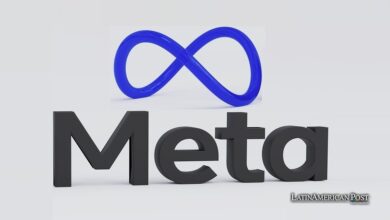AI-Authored Laws: A Threat to Human Thought
The recent revelation that a Brazilian city enacted AI-written legislation sparks concern over the potential erosion of human intellect and authentic legislative progress

Photo: LatinAmerican Post
The Latin American Post Staff
Listen to this article
Leer en español: Leyes escritas por IA: una amenaza al pensamiento humano
AI's Legislative Foray: A Groundbreaking, Alarming Shift
In a groundbreaking yet alarming development, city lawmakers in Porto Alegre, Brazil, have passed what appears to be the nation's first legislation authored entirely by artificial intelligence. This incident, brought to light by city councilman Ramiro Rosário, is more than just a technological novelty; it is a harbinger of the potential limitations AI could impose on human thought, knowledge, and progress.
Rosário's decision to use OpenAI's ChatGPT to draft a proposal without informing his peers of its digital genesis raises ethical questions. By relying on AI for legislative drafting, we risk undermining the very essence of human-led governance. Legislation, traditionally, is the culmination of human experience, wisdom, and debate. Replacing this process with AI-generated content, no matter how sophisticated, strips law-making of its human touch – an integral component of democratic decision-making.
The unanimous approval of the ordinance, under the guise of human authorship, illustrates a worrying scenario where AI can invisibly infiltrate critical areas of public policy without accountability or transparency. This stealthy insertion of AI into legislative processes could lead to a gradual erosion of human involvement in governance, potentially paving the way for an over-reliance on technology that lacks the nuances and ethical considerations inherent to human judgment.
AI and Legislative Decision-Making: A Dubious Justification
Moreover, Rosário's justification – that revealing the AI's role would have risked the proposal's rejection – is telling. It suggests an awareness that AI's involvement in law-making is, at best, ethically dubious and, at worst, a threat to the authenticity and legitimacy of the legislative process. The essence of law-making lies in human deliberation, understanding, and consensus. Replacing this with AI-generated content undercuts the democratic process, transforming it into a mere automation exercise devoid of human insight and oversight.
The incident in Porto Alegre is not an isolated case of AI overreach. Globally, there is a burgeoning debate over the role of AI in various sectors. While AI offers numerous benefits, its unchecked expansion into areas traditionally governed by human intelligence and discretion is a cause for concern. For all its computational prowess, AI needs to comprehend the moral and ethical dimensions that underpin human decision-making, particularly in the complex realm of public policy.
Integrating AI into legislative drafting also raises concerns about transparency and accountability. AI algorithms, often proprietary and opaque, can embed biases and errors that go unnoticed until implemented in real-world scenarios. The need for more transparency in AI's decision-making processes poses a significant challenge, as it becomes difficult to pinpoint responsibility for flawed or biased legislation.
Diminishing Human Expertise: Risks of Sidelining Human Input
Moreover, using AI in law-making risks diminishing the role of human expertise and experience. Legislators, legal experts, and policymakers bring knowledge and understanding – aspects AI cannot replicate. By sidelining human input, we risk creating a legislative environment that is technically efficient but lacks depth, empathy, and the ability to adapt to complex societal needs.
Also read: Reviving Brazil's Atlantic Forest: A Corridor for Golden Lion Tamarins
In conclusion, the use of AI in drafting legislation in Porto Alegre should serve as a cautionary tale. It highlights the need for a careful, balanced approach to integrating AI into sectors where human judgment and ethics are paramount. As we stand on the cusp of a technological revolution, we must ensure that AI enhances human capabilities, not replace them. We must guard against allowing AI to limit the scope of human thought, knowledge, and progress, particularly in areas as critical as law-making. After all, the fabric of our society and the integrity of our democratic processes depend on it.




